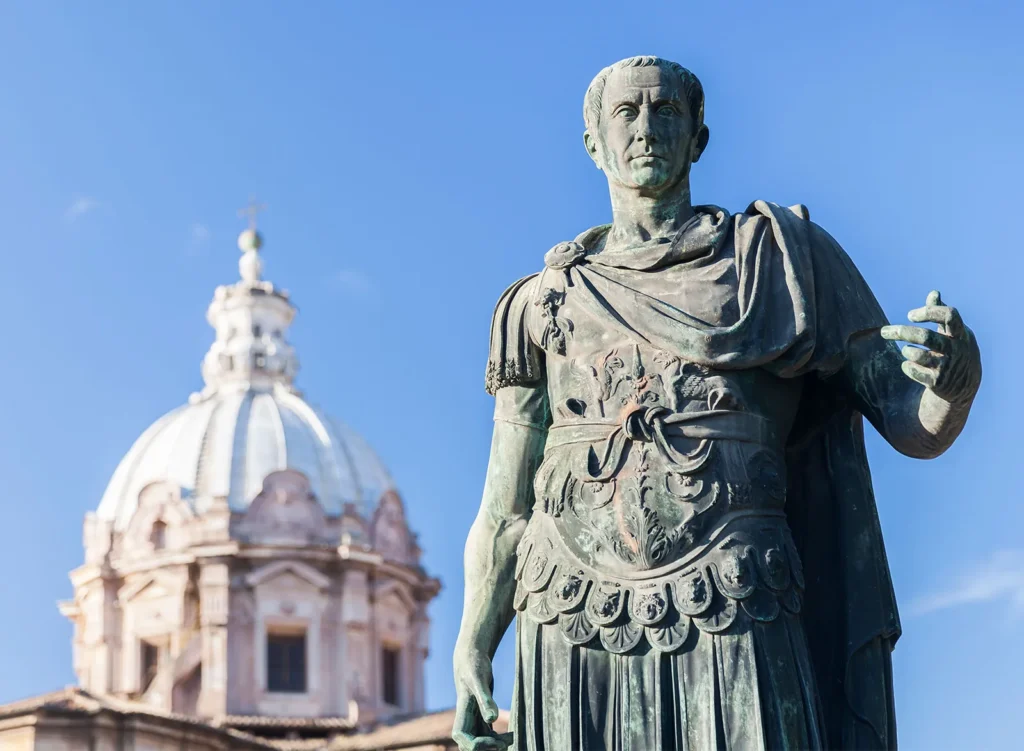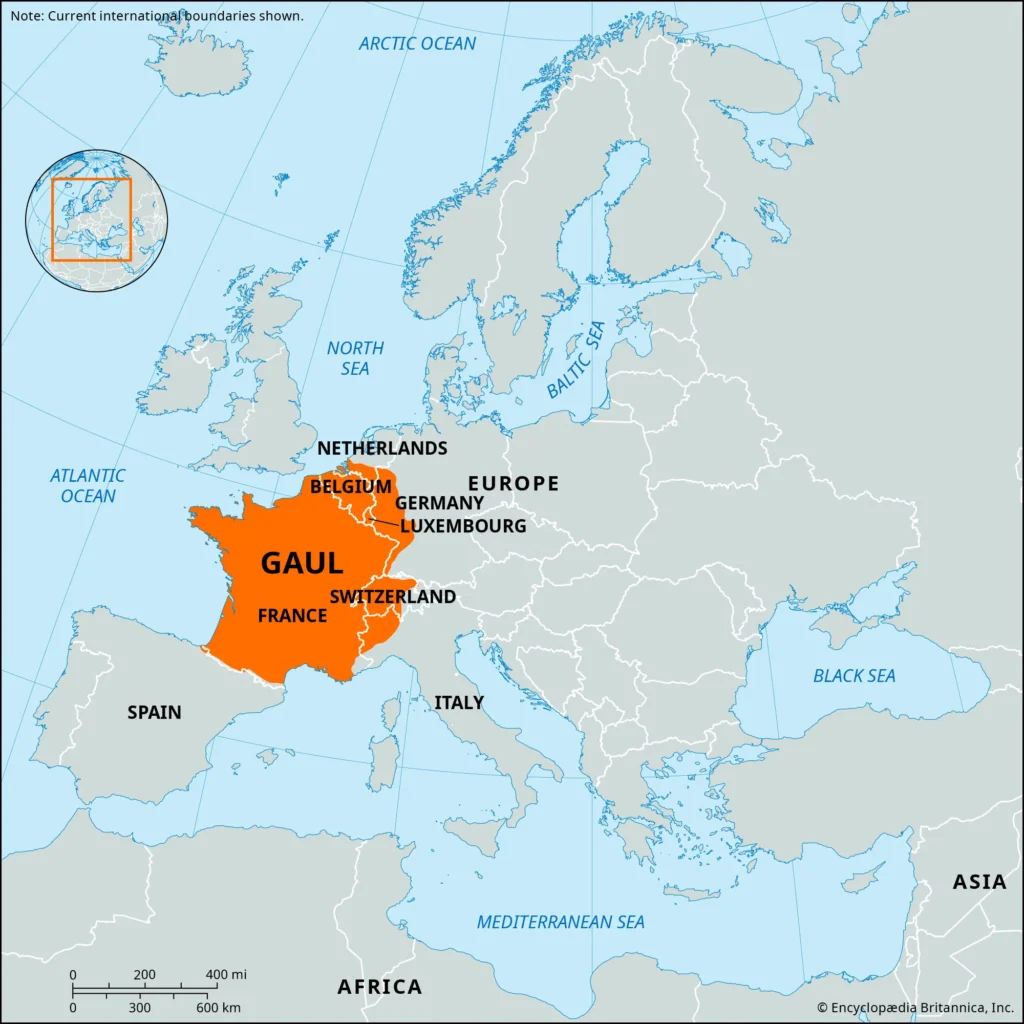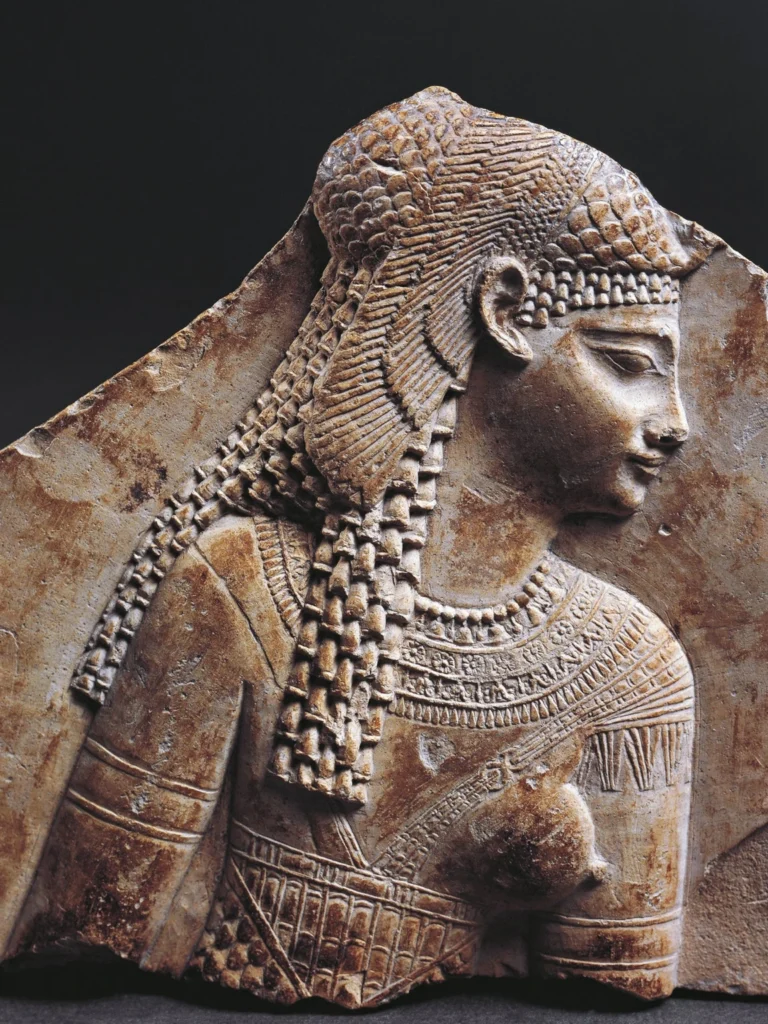Julius Caesar was, without a shadow of a doubt, one of Ancient Rome’s most iconic and influential political figures.
He rose to a nearly untouchable power within the Roman political system through his political acumen and military prowess.


Caesar’s life was filled with all the elements of a great story. He experienced betrayal and triumph in his quest for power.
He made alliances that would shape the path of Rome’s government for years after his death.
But as it does for so many, his quest would end in the ultimate betrayal.
Rise Of Caesar
Julius Caesar was born in 100 BC. Historians know that he was born in July (mainly because the month was later named after him), though the exact date of his birth falls on either 12 July or 13 July.
His family claimed to be descended from the goddess Venus, which gave him a noble lineage in the eyes of the Roman public.
As a child, Caesar was considered intelligent and ambitious, traits that would help him in the years to come. Politics in Rome was never easy, but Caesar projected the right traits to take the city and the Republic by storm.
His political career got off the ground with an alliance that was later named the First Triumvirate.
The First Triumvirate
The formation of the First Triumvirate in 60 BC marked a pivotal point in Caesar’s political career. This alliance consisted of Caesar, Pompey the Great, and Marcus Licinius Crassus.
While the name of this alliance gives the impression that it was a formal political institution, this wasn’t the case. Instead, these three men realized that they had more to gain by flocking together against the rest of the Roman political climate.
Each member presented traits that filled in where the others lacked. Caesar was ambitious and charismatic. At the time, his reputation as a statesman and skilled orator made him an asset.
Crassus was an important political figure with the connections and finances to back any venture. He was the wealthiest man in Rome at the time, and in Rome, money was power. There was nothing he couldn’t get done if he set his mind to do it.
Pompey was a celebrated general who was extremely popular in Rome. With the military prowess needed to garner faith among the people, his inclusion in the First Triumvirate was a major benefit for the others.
Though these three didn’t always get along, their alliance helped Caesar gain a foothold that he would retain for the rest of his life.
When he became consul in 59 BC, he used his power to pass legislation that was favorable to his allies, gaining more power than he might have alone.
Conquest Of Gaul
Around the time that Caesar became consul, Gaul became a problem. In ancient Rome, ‘Gaul’ was the name Romans used to refer to Western Europe, especially countries like France and Belgium.
Gaul wasn’t an empire or a single governmental entity. Instead, Gallic and Germanic societies were separated into native tribes, each with their own chieftain.

Around this time (59 BC), Gallic and Germanic tribes began to form alliances, and some even attacked Rome.
Now that he knew what a little bit of power and popularity could do, Caesar was interested in gathering as much influence as possible. One of the ways he could do this would be to conquer Gaul.
This would impress the Senate and the people of Rome, as well as secure funding and power for him. Between 58 BC and 50 BC, Caesar began the conquest of Gaul to expand the Roman Republic.
He wrote about his time in Gaul in his work “Commentaries on the Gallic War”, which provided a detailed account of the strategies he employed and how he drove back the tribes of Gaul.
Of course, the conquest wasn’t smooth. Eight years of uprisings, alliances, complex battles, and sieges took their toll on Caesar, but they also shaped him into the figure he became.
In 52 BC, the siege of Alesia gained Caesar a pivotal win in the campaign. Though his forces were outnumbered, he emerged victorious to crush the remains of Gallic influence.
When it was done, Julius Caesar was popular and well-liked in Rome. He gained a reputation for successful military ventures and secured valuable land for the Republic.
Here, we start to see the winds of change blowing; this victory, some have speculated, was one of the events that led to the death of the Republic and the birth of the Empire.
Roman Civil War
Whether spurred by his victory or intimidated by his success, the campaign in Gaul was a contributing factor to the collapse of the First Triumvirate.
Even as his popularity was rising among other political figures and the people of Rome, the Senate thought he had too much power.
They ordered him to disband his army, which he’d gathered over his eight-year campaign.
Instead of giving in to the Senate and relinquishing his power, Caesar took his army across the Rubicon River. Since Caesar was a general assigned to a province, this act was a direct violation of Roman law.
Spurred by this flagrant disregard for the law, Pompey, Caesar’s old ally, tried to stop his ever-spreading influence. This led to the Great Roman Civil War, which pitted Caesar against Pompey and his powerful allies in the Senate.
This war didn’t last nearly as long as the campaign in Gaul. Though Pompey was originally part of the Triumvirate because of his military prowess, it was obvious that Caesar had surpassed him.
His unwavering determination cut the civil war short through a series of decisive victories, which culminated in the Battle of Pharsalus in 48 BC.
After his defeat at this battle, Caesar chased Pompey to Egypt, where he was swiftly assassinated. Here, Caesar found yet more opportunities to secure power and alliances.
Caesar And Cleopatra
In 48 BC, Cleopatra was at war. She originally ruled Egypt jointly with her brother, Ptolemy XIII. Much like Caesar, Cleopatra had ambition that far outweighed her station; as a woman, she had less of a chance to seize it with clever maneuvering.

She wanted to gain the throne of Egypt for herself, which led to a political rivalry between herself and her brother.
When Caesar arrived to chase down Pompey, she saw an opportunity. She sought him out and endeared him to help her win back her throne, which quickly turned into a personal and political alliance.
Caesar, on the other hand, wanted more influence elsewhere. Helping Cleopatra was a way to give himself a foothold in Egypt and ally himself with powers outside of Rome.
With the recent political upheaval there, he may have felt that Egypt was an important strategic asset.
Through the course of their alliance, they had an affair. This resulted in a son, Caesarion, whom Cleopatra would leverage to win herself elevated status in Egypt and Rome.
Caesar’s support started Cleopatra on her way to regaining her throne, but Caesar was pressured to return to Rome to address the political unrest there soon after.
Reform In Rome
In the years after Egypt, Caesar saw his political ideals realized. He worked to reform Rome’s governmental structure and centralize power.
While the results of his efforts weren’t immediately apparent, these changes shifted Rome from a Republic to an Empire in the years following his death.
His changes included significant reforms that changed how Rome worked on a fundamental level. He restructured the Senate and reduced the power of the aristocracy.
These moves, along with a series of economic and administrative changes, worked to centralize power within Rome.
Because Rome had been unstable under the Republic, some welcomed the change. The structure that Caesar was trying to create would put Rome in the hands of a singular leader, which could create unchecked power.
Many viewed it as a stabilizing move, while others thought it tyrannical that one person would have power over all of Rome.
These reforms continued through 45 BC, which ended with Caeser holding multiple important positions of authority within the Roman government.
Dictator For Life
The next natural step was for Caesar to seize control of the centralized government. On February 15, 44 BC, the Senate declared him dictator for life (“Dictator Perpetuo” in Latin). He’d realized his ambitions and had become the sole leader of Rome.
This position, he felt, would help stabilize an uncertain Rome. This would eliminate the need for annual elections, creating absolute control that would eliminate opposition.
One of his hopes for a new, centralized power was to do away with the indecision that plagued the Senate and the rest of the government. With a single ruler, reforms could take place quickly and governance could be more effective.
While these changes were favorable to the people of Rome, the Senate was not so convinced. A sect of traditionalists resisted change and believed that Caesar’s reforms were a betrayal of the values long held by the Republic.
The Ides Of March
Caesar’s unchecked power didn’t last. The traditionalists within the Senate formulated a plan to eliminate Dictator Perpetuo and all his centralized power.
On March 15, 44 BC (just one month after being declared the leader of Rome), Caesar was betrayed. Marcus Junius Brutus and Gaius Cassius Longinus led a group of 60 conspirators within the Senate to fatally stab Caesar.
This day is infamously referred to as The Ides of March. The death of Caesar on the Senate floor sent into motion a cascade of changes that moved his ideals forward – including the move away from the Republic.
Caesar’s nephew and adopted son, Octavian, became the first Emperor of Rome when the Republic fell in 27 BC. This helped shape Rome and the world we see today, and it all started with Caesar’s ambition.
Conclusion
Caesar was deified two years after his death when the Senate titled him “The Divine Julius.” While he wasn’t alive to see his machinations come to fruition, his actions directly led to the birth of the Roman Empire as we know it today.
Rome stabilized quickly, leading to years of prosperity and growth that would set the world ablaze.
Today, Caesar is a household name; he is the namesake of medical procedures, foods, and beyond. Few know his full story, but many know that his ambition shaped the world we live in.
Sources
https://www.bbc.co.uk/history/historic_figures/caesar_julius.shtml
https://www.britannica.com/topic/Ides-of-March
https://www.britannica.com/biography/Julius-Caesar-Roman-ruler
https://education.nationalgeographic.org/resource/julius-caesar
https://www.pbs.org/empires/romans/empire/julius_caesar.html













Leave a comment